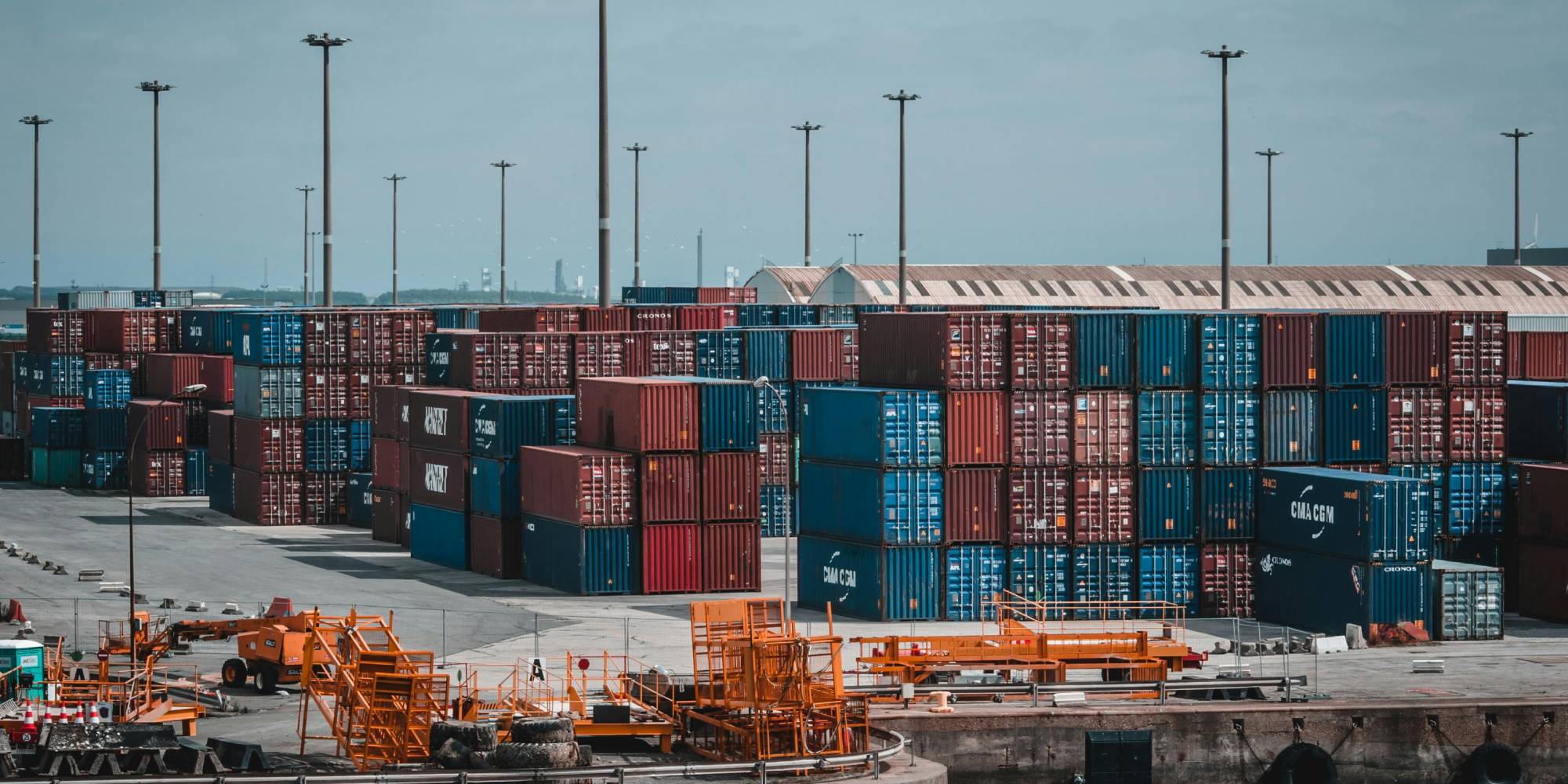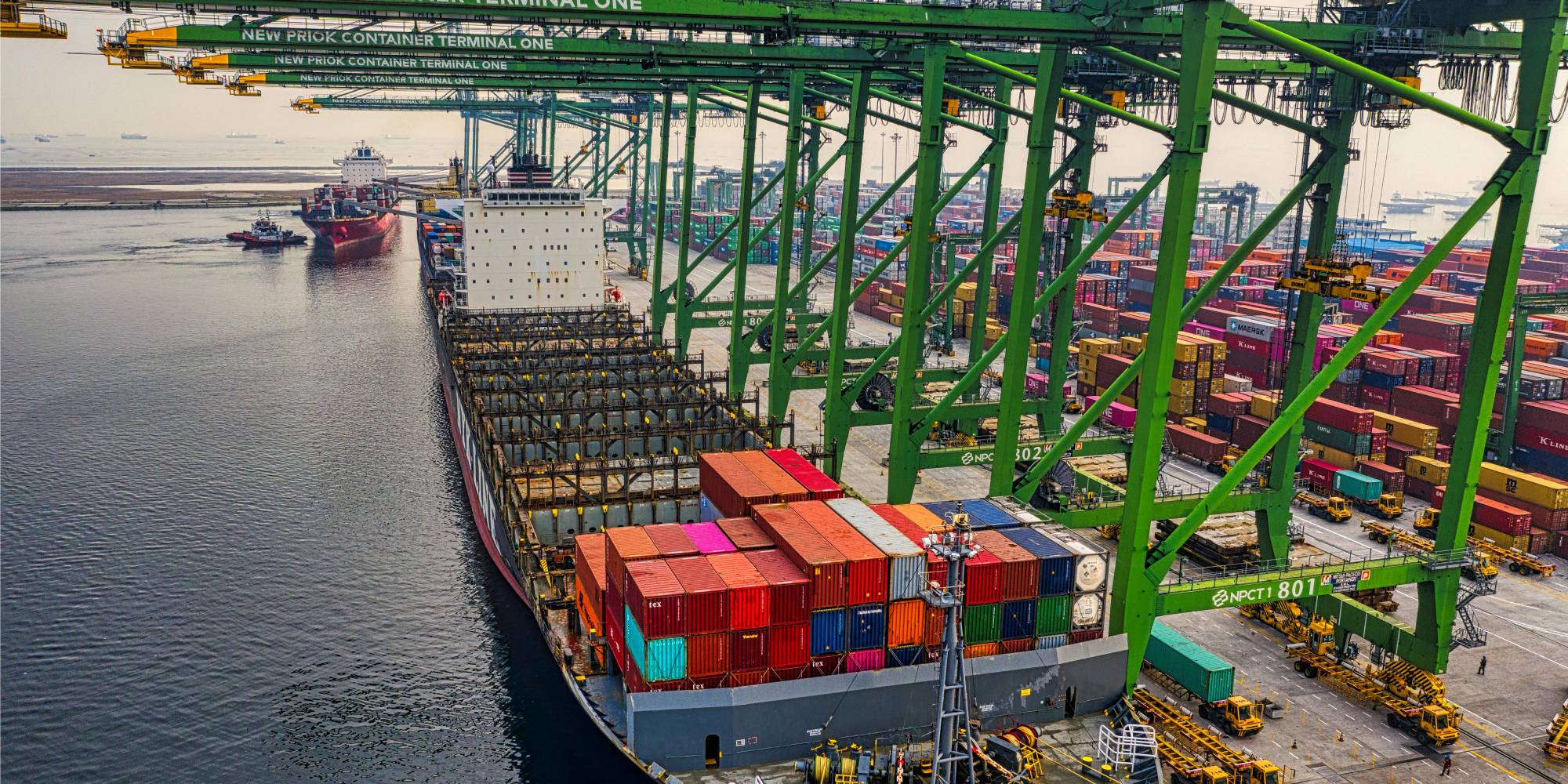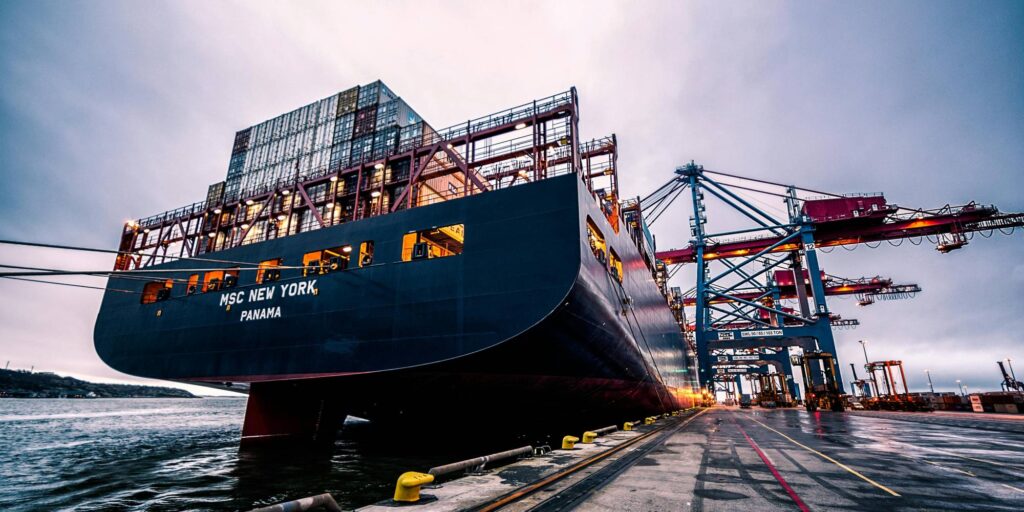New York City’s commercial engine runs on the movement of goods, materials, and services. In the heart of one of the busiest urban centers in the world, efficient freight logistics in NYC is not just a convenience—it’s a necessity. From retailers to industrial suppliers, every business depends on the seamless transportation of products to survive and thrive. That said, understanding freight logistics in NYC is critical for staying competitive.
Here are the essential processes, key players, and unique challenges in freight strategy that every business should know.
Table of Contents
Key Takeaways✔ Efficient freight logistics in NYC helps reduce delays, cut costs, meet customer expectations, and support business growth and resilience. ✔ The freight logistics process involves structured steps—from pickup to reverse logistics—that ensure accuracy, speed, and customer satisfaction. ✔ Businesses must choose the right freight mode (trucking, rail, air, or maritime) based on cargo type, urgency, and NYC’s unique operational challenges. ✔ Freight forwarding in NYC relies on multiple key players, including 3PLs, carriers, customs brokers, and local couriers—all critical to smooth logistics. |
1. Why Efficient Freight Logistics Is Crucial for Business
Efficient freight logistics in NYC is not just about moving goods from point A to point B—it’s about safeguarding a company’s financial health, reputation, and customer relationships. In a market as demanding and fast-paced as New York City, businesses that invest in smart logistics systems can outperform competitors and build lasting trust.
1. Reducing Delays
Traffic congestion, construction projects, and strict delivery windows make NYC one of the toughest cities for transportation. Without a proactive plan, shipments can be delayed for hours or even days.
- Route Optimization: Smart scheduling and route planning minimize exposure to heavy traffic and construction zones.
- Alternative Delivery Options: Having backup methods, such as different modes of freight transportation in NYC, ensures flexibility when obstacles arise.
2. Controlling Costs
Inefficient freight operations can bleed money through overtime, fuel waste, missed deadlines, and storage fees. Freight logistics in NYC must balance operational expenses without compromising service.
- Fuel and Toll Management: Efficient routing reduces time spent idling and avoids unnecessary toll costs across bridges and tunnels.
- Labor Optimization: Reducing delays lowers labor costs tied to driver overtime and warehouse staffing needs.
- Inventory Management: Reliable freight shipping solutions in NYC enable better inventory turnover, decreasing the need for costly storage.
3. Meeting Customer Expectations
Customers today expect fast, transparent, and accurate deliveries, whether it’s B2B clients or individual consumers. Missing delivery windows can directly impact sales and loyalty.
- Real-Time Tracking: Providing customers with updates through supply chain logistics in NYC enhances transparency and reduces inquiry burdens on customer service teams.
- On-Time Delivery Metrics: Businesses using efficient freight forwarding in NYC can hit key performance targets that set them apart from competitors.
4. Enhancing Business Reputation
Reputation is everything in New York’s competitive marketplace. One mishandled delivery can ripple into lost clients, negative reviews, and decreased market share.
- Damage Control: Timely deliveries reduce product damage risks, especially for fragile or perishable goods.
- Brand Reliability: Consistent logistics performance positions businesses as trustworthy and professional in the eyes of customers and partners.

5. Boosting Operational Scalability
As businesses grow, logistics needs often become more complex. Efficient freight logistics in NYC allows companies to scale without significant disruptions.
- Seamless Volume Increases: Systems designed for efficiency can absorb surges in shipping volume without bottlenecks.
- Expansion Opportunities: Businesses with robust freight transportation in NYC can expand into new markets faster and more confidently.
6. Strengthening Supply Chain Resilience
Efficient logistics acts as a buffer against supply chain disruptions, whether from weather events, labor shortages, or regulatory changes.
- Diversified Freight Options: Access to multiple freight shipping solutions in NYC provides contingency plans if one mode becomes unavailable.
- Agility in Crisis: Businesses that streamline freight forwarding in NYC can pivot quickly during emergencies, maintaining service continuity.
- Public Investment in Innovation: In 2024, New York City secured a $5.6 million USDOT RAISE grant to establish an Urban Freight Lab. This initiative aims to innovate and improve urban freight logistics, reflecting the city’s commitment to enhancing freight operations.
2. The Freight Logistics Process
Freight logistics is a multi-phase operation involving more than just shipping items. Each step plays a crucial role in maintaining consistency, minimizing errors, and ensuring customer satisfaction. Businesses managing freight logistics in NYC must understand this process from start to finish to run smooth and responsive operations.
1. Pickup
The process starts at the point of origin—whether that’s a supplier, manufacturing plant, or distribution hub. It sets the tone for the entire shipment journey.
-
- Inventory Verification: Ensures the right quantity and type of goods are prepared for shipment.
-
- Labeling and Documentation: Proper labeling with barcodes, packing lists, and bills of lading is essential for tracking and compliance.
- Load Inspection: Verifying that packaging is intact and loads are secure reduces damage risk during transit.
- Time Coordination: Pickup must be aligned with truck schedules and facility availability to prevent bottlenecks.
2. Transportation
This stage involves moving freight from the origin to a hub or final destination. In NYC, transportation must be fast, flexible, and highly strategic.
-
- Mode Selection: Freight transportation in NYC may include trucks, rail, air, or maritime options depending on distance, urgency, and cost.
- Route Optimization: Choosing routes that bypass congested zones and time-restricted streets helps avoid fines and delays.
- Regulatory Compliance: Adhering to size, emissions, and delivery-time restrictions is crucial to avoid violations in NYC.
- In-Transit Tracking: Real-time monitoring allows for quick response to unexpected detours or disruptions.
3. Last-Mile Delivery
The final leg of delivery is often the most resource-intensive, especially in dense urban areas like NYC.
-
- Curb Access Planning: Navigating limited loading zones and no-parking areas requires knowledge of street regulations.
- Time Window Management: Many buildings in NYC have strict delivery windows, making precise scheduling vital.
- Use of Local Couriers: Some freight shipping solutions in NYC leverage smaller, more nimble delivery vehicles or even bikes for short-range drops.
- Customer Coordination: Providing delivery ETAs or signature requirements improves the end-user experience.
4. Reverse Logistics
Efficient freight logistics in NYC must also account for the flow of goods in reverse—returns, recycling, or repair.
-
- Return Authorization Handling: Generating RMAs and coordinating pickups is key to organized returns.
- Reintegration or Disposal: Depending on the product’s condition, it may be restocked, refurbished, or responsibly discarded.
- Data Tracking: Reverse shipments must be tracked with the same care as outbound freight to maintain inventory accuracy.
- Customer Satisfaction: A seamless return process supports brand trust and loyalty.
5. Coordination Across the Supply Chain
Though not a standalone step, coordination with various partners is essential throughout the freight process.
-
- Freight Forwarding in NYC: Professionals help businesses manage multi-modal shipments, customs documents, and carrier communication.
- Integrated Software Systems: Many businesses use platforms to tie together all logistics activities—from pickup through delivery and returns.
- Vendor and Warehouse Communication: Constant updates between warehouses, carriers, and retailers ensure a unified supply chain logistics in NYC.
3. 5 Key Freight Modes Used in NYC
Selecting the appropriate mode of freight transportation in NYC is critical to achieving a balance between delivery speed, operational cost, cargo type, and destination. Each mode presents unique advantages and constraints within the city’s dense and regulated environment.
1. Trucking
Trucking remains the backbone of freight forwarding in NYC, especially for local and regional distribution. It offers point-to-point service and flexible scheduling.
-
- Flexibility in Routing: Trucks can serve varied locations, including dense urban neighborhoods and remote areas not serviced by rail or port.
- Scalable for Different Loads: Capable of handling both full truckloads (FTL) and less-than-truckload (LTL) shipments, depending on business needs.
- Extensive Road Network: New York City boasts nearly 1,000 miles of designated truck routes, facilitating the movement of goods across its five boroughs. This expansive network is crucial for maintaining efficient freight transportation within the city.
- Challenges to Consider: Heavy congestion during peak hours, limited curb access and restricted delivery windows, and high toll costs for bridge and tunnel crossings.
2. Rail Freight
Though less visible within the five boroughs, rail freight supports high-volume shipments and plays a supporting role in regional supply chain logistics in NYC. Rail freight reduces road traffic and lowers carbon emissions compared to trucking.
-
- Ideal for Bulk Goods: Suited for transporting raw materials, construction supplies, or packaged consumer goods in large volumes.
- Cost-Effective Over Long Distances: Rail offers lower cost per ton-mile compared to road transport, particularly for intercity routes.
- Strategic Rail Terminals: Intermodal rail hubs in New Jersey and upstate New York provide access points for rail-to-truck transitions feeding into NYC.
3. Air Freight
Air freight is the fastest method of freight transportation in NYC and is commonly used for time-sensitive or high-value shipments.
-
- Quick Transit Times: Ideal for urgent deliveries that require overnight or same-day shipping.
- Common Use Cases: Medical supplies and pharmaceuticals, electronics and high-value consumer goods, and emergency industrial components.
- Trade-Offs: While fast, air freight is the most expensive mode and typically reserved for lightweight or critical items.

4. Maritime Shipping
The Port of New York and New Jersey is one of the busiest and most strategically located seaports in the U.S., playing a critical role in international freight shipping solutions in NYC.
-
- Containerized Cargo: Handles a vast volume of consumer goods, machinery, and raw materials arriving via sea.
- Access to Global Markets: Enables businesses to import and export products through major global shipping lanes.
- Customs and Compliance: Freight forwarding in NYC often includes managing customs documentation, duties, and inspections at port facilities.
- Intermodal Connectivity: Goods arriving at the port can be transferred to trucks or trains for final delivery across the metro area.
5. Multi-Modal Logistics Solutions
Many businesses use a combination of modes to streamline delivery and reduce overall cost, an approach increasingly vital for supply chain logistics in NYC.
-
- Port-to-Truck-to-Warehouse Models: Container freight arrives at the port, is offloaded to trucks, and then delivered to regional fulfillment centers.
- Air-to-Courier Transitions: High-priority cargo may arrive by air and be handed off to local couriers for fast final-mile delivery.
- Rail-Truck Integration: For businesses based in outer boroughs or suburbs, intermodal terminals provide seamless transition from rail to road.
4. Who Are the Key Players in Freight Logistics
Freight logistics in NYC involves a web of professionals and organizations working together to move goods seamlessly. Understanding the roles of each player helps businesses choose the right support systems for efficient, compliant, and cost-effective operations.
1. Freight Forwarders
Freight forwarding in NYC serves as the backbone of complex, multi-leg shipments, especially across state lines or international borders.
-
- Multimodal Coordination: Forwarders arrange combinations of trucking, air, rail, or maritime transport to ensure the most efficient route.
- Documentation Management: They handle bills of lading, certificates of origin, and other necessary shipping paperwork.
- Customs Support: For imports/exports, they work with customs brokers to ensure compliance and avoid costly delays.
- Risk Management: Many offer cargo coverage, reducing financial exposure in case of loss or damage.
2. Third-Party Logistics (3PL) Providers
3PL companies provide end-to-end supply chain support, making them essential for businesses needing logistics without building internal infrastructure.
-
- Warehousing & Fulfillment: They operate storage facilities and handle order picking, packing, and shipping.
- Inventory Management: Use of digital platforms to track stock levels and reorder points in real time.
- Scalability: Services scale up or down based on seasonal demand or business growth.
- Integration: Many integrate seamlessly with e-commerce platforms and freight shipping solutions in NYC for streamlined operations.
3. Carriers and Couriers
These are the physical movers of goods—whether by truck, plane, rail, or sea.
-
- Trucking Companies: Handle ground freight within and beyond city limits.
- Airlines & Ocean Liners: Move goods across state or international borders depending on speed and cost requirements.
- Courier Services: Provide fast, often same-day delivery—crucial for last-mile logistics in NYC.
- Tech-Enabled Services: Many carriers now offer GPS tracking, proof-of-delivery, and route optimization tools for transparency.
4. Customs Brokers
In international freight forwarding in NYC, customs brokers play a vital compliance role.
-
- Tariff Classification: Ensure the correct categorization of goods to determine applicable duties and taxes.
- Import/Export Documentation: Prepare and file entry paperwork, declarations, and licenses required by U.S. Customs and Border Protection.
- Regulatory Guidance: Help businesses navigate ever-changing trade regulations, embargoes, and import quotas.
- Port Coordination: Work closely with port authorities for smooth cargo release and inspection scheduling.
5. Local Delivery Services
These specialized players handle short-range, high-urgency deliveries—the most challenging aspect of freight logistics in NYC.
-
- Last-Mile Focus: Experts in navigating NYC’s traffic, street restrictions, and delivery windows.
- Smaller Fleets: Operate vans, e-bikes, and cargo bikes that are more maneuverable in tight spaces.
- White-Glove Services: Some providers offer in-building delivery, setup, and returns.
- Same-Day Capabilities: Support retail, medical, and perishable product sectors with immediate delivery needs.
5. How to Choose the Right Freight Logistics Partner in NYC
The success of your freight strategy hinges on your choice of logistics partner. Here’s how to evaluate your options:
1. Prioritize NYC Experience
Providers unfamiliar with NYC’s landscape may struggle to comply with local laws or optimize routes. Choose partners with a proven track record in freight transportation in NYC.
2. Look for Real-Time Tracking
Transparency builds trust. Companies offering real-time tracking of shipments give businesses the ability to monitor delivery progress and adjust to disruptions quickly.
3. Ask About Scalability
As your business grows, so will your logistics needs. Opt for providers that offer flexible freight shipping solutions in NYC capable of adapting to seasonal or volume-based changes.
4. Evaluate Customer Support
Responsive, knowledgeable support teams are critical during delays or emergencies. Partner with a provider that prioritizes communication and fast problem resolution.
5. Check for Integrated Services
The best logistics partners can manage the full supply chain—from warehousing to freight forwarding in NYC—ensuring efficiency and fewer points of failure.
Frequently Asked Questions
What is the meaning of freight logistics?
Freight logistics refers to the organized planning and management of moving goods from one location to another. It covers everything from coordinating transportation modes to ensuring timely, safe, and cost-effective deliveries. Efficient freight logistics is critical for keeping supply chains running smoothly.
Does logistics mean trucking?
Logistics is much broader than just trucking. It includes managing the entire flow of goods, such as inventory control, warehousing, transportation (by truck, rail, air, or sea), and final delivery. Trucking is one part of the logistics process, primarily responsible for ground transportation.
What is the difference between shipping and freight?
Shipping typically refers to the movement of smaller packages or parcels, often handled by carriers like FedEx or UPS. Freight usually involves larger, heavier goods transported in bulk through trucks, railcars, ships, or planes. In logistics, “freight” often requires more specialized handling and coordination than standard shipping.
Is freight the same as trucking?
Freight refers to the goods being transported, while trucking is a method used to move those goods. In freight logistics, trucking is just one transportation mode alongside rail, air, and maritime shipping. Not all freight is moved by truck, but trucking remains a vital part of many freight operations.
What is an example of freight logistics?
An example of freight logistics is transporting a shipment of electronics from a warehouse in New Jersey to a distribution center in Brooklyn. This could involve coordinating pickup, selecting the best trucking route, and managing delivery timing. It may also include inventory tracking and paperwork to ensure compliance and smooth transfer.
Streamline Your Freight Logistics with 3PL Logistics By Best!
If your business in New York City is ready to upgrade its supply chain operations, 3PL Logistics By Best is the partner you can trust. Based in New York City, 3PL Logistics By Best offers a full suite of freight logistics services tailored to the unique demands of urban businesses. Whether you need expert freight forwarding in NYC, comprehensive supply chain logistics in NYC, or customized freight shipping solutions in NYC, our team has you covered.
Contact 3PL Logistics By Best today to simplify your logistics.

